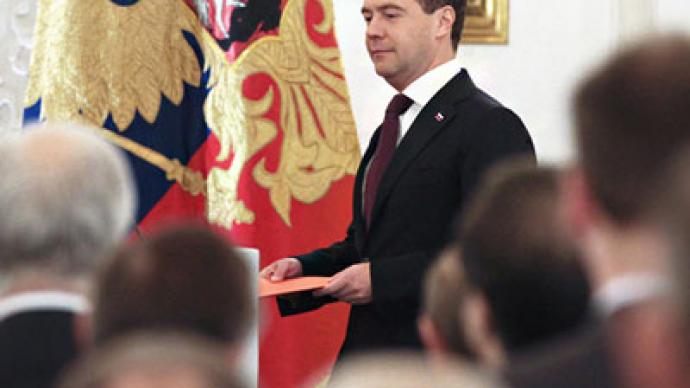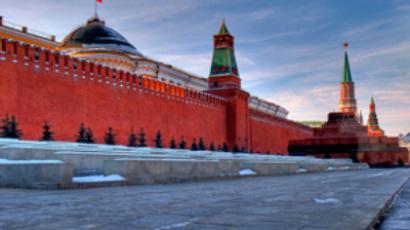Russia’s foreign view not just to the West

RT Politics asked Russia's leading political commentators for their thoughts on the President's address to the Federal Assembly, which dealt with dozens of issues on domestic and foreign policy.
Viktoria Panova, political analyst, Moscow State Institute of International Relations
Dmitry Medvedev gave the West a choice with this speech.He re-stated his readiness to integrate Russia into the worldwide missile defense system, something he first mentioned this spring in Lisbon. Regrettably for him, the proposals have been coolly received in the West, with the viability of Russia’s participation to be evaluated by experts. What the Russian President wants to see is for the West to show some political will in resolving the issue, not just expert opinions.Consequently, the other part of his speech showed that Russia has teeth. His main thrust was that everyone will suffer if the West does not take up Russia’s offer, not least because of a potential new arms race between Russia and NATO. It is notable that he dedicated a large portion of his address to detailing the modernization of the Russian army, which will be getting a significant funding increase over the coming years.The ball is now in the court of the Western leaders. They may see him as a leader who is offering up the olive branch yet again, or his speech may be spun as saber-rattling. Whatever it is, despite being the leader of a nuclear power, Medvedev alone cannot override the geopolitical balance of power in the world.
Vyacheslav Nikonov, president, Politika Foundation
Before this speech a lot of people expected Medvedev to come out with sharp criticism of the ruling class – the politicians and the bureaucrats. But to a large extent his speech chimed with their concerns. He seemed to be reaching out to them, and trying to get their endorsement. Their support will be necessary for Medvedev to lead effectively for the remainder of this term, but also this can be seen as preparation for the presidential elections in 2012.I thought what he was proposing internationally was a clever system of checks and balances. On the one hand, he offered greater possibilities of co-operation with the West, on the other he was saying that if the West does not take up the opportunities on offer, Russia will be a prickly opponent on issues such as missile defense. The fact that he mentioned the relationship with CIS countries shows that Russia isn’t just looking to the West, but continues a multi-vector foreign policy.Otherwise, this was a very tightly-structured speech. It was full of concrete proposals, more so than any of the previous state-of-nation addresses he’s given.
Evgeniy Minchenko, International Institute of Political Expertise
To me this was a pre-election speech from Dmitry Medvedev. You could tell from the range of issues, and from the calculated swell of emotion towards the end, that this is him setting out his stall. I would saythat there is a more than 80 per cent chance that Medvedev will standin the next presidential election.I thought thatchanging the line from just “modernization” to “modernization thathelps ordinary people” was a good move. But the speech was just asremarkable for the problems it didn’t mention – the difficultrelationship between Moscow and the regions, instability in theCaucasus, civil society and media freedoms. Even with the issue ofcorruption, he seemed to imply that sorting that out was just atechnical issue, not one that fundamentally threatens society.Oninternational issues, Medvedev did not deliver anything new, or at oddswith Russia’s diplomatic lines. It is clear that the issue of missiledefense and NATO are still prominent in Russia’s relationship with theWest.Overall, I thought this was a very optimistic, aspirational speech.
Aleksey Mukhin, Director, Political Information Center
The speech was extremely emotional. I wondered if the major subject of children, and particularly, disadvantaged children was suggested by the President’s wife Lyudmila Medvedeva, who works a lot with them for charity. But for all the emotion, this was a very professionally constructed speech, and you could see the number of different policymakers’ input that went into it.For those who were listening carefully, Medvedev also emphasized the strength of the working relationship between Vladimir Putin and himself. For example, he made a specific point of mentioning environmental policy, which is a subject close to the Prime Minister’s heart.There were two parts of the speech that, in my opinion, were not very well received by the audience. The first is the part about the restoration of trust towards the elections and other democratic institutions by 2011 which, not coincidentally, is the date of the next parliamentary elections. It seemed as if the dominant United Russia representatives are quite happy with the status quo. The other part was about Russia’s participation in a proposed global missile defense system. A lot of the Russian generals, who were in the room, are quite skeptical about the idea.













